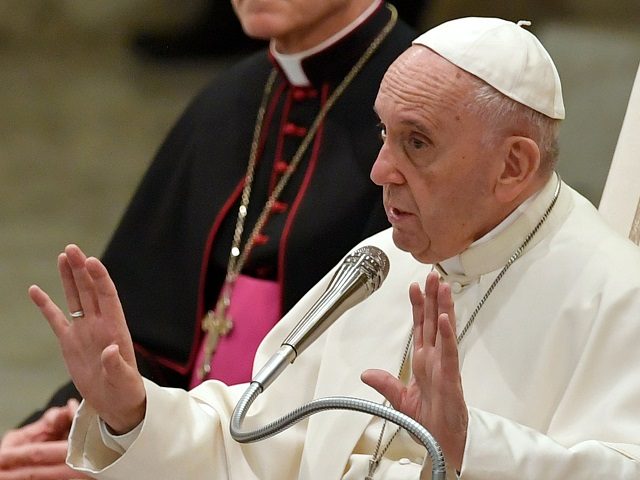Pope Francis has once again taken advantage of his annual address to members of the Roman Curia to denounce Vatican officials who fail to fall in line with his ideas of reform for the Catholic Church.
As he has done on prior occasions, the Pope pulled no punches in his speech on Thursday, subtly warning those who work in the Vatican offices that no opposition or resistance to his agenda would be tolerated.
In the first place, he condemned the “unbalanced and debased mindset of plots and small cliques,” in reference to those who form small groups critical of papal decisions. Despite all their justifications and good intentions, the Pope said, this mentality is “a cancer leading to a self-centredness that also seeps into ecclesiastical bodies, and in particular those working in them.”
A second danger, Francis declared, are the “traitors of trust or the exploiters of the Church’s maternity.” In serving in the Curia, these traitors were “carefully selected to give greater vigor to the body and to the reform,” yet—not understanding the loftiness of their mission—allowed themselves to be “corrupted by ambition or by vainglory.” Then, he continued, “when they are gently removed, they declare themselves to be martyrs of the system, of an ‘uninformed pope,’ or the ‘old Guard’…, instead of offering a ‘mea culpa.’”
Thirdly, the pontiff continued, there are “others who still work in the Curia, to whom is given all the time needed to return to the right path, in the hope that they find in the Church’s patience an opportunity for conversion and not for personal advantage.” By this, the Pope seemed to fire a shot across the bow of those he has identified as problematic, but who have not yet been removed from their posts.
There are several examples in recent memory to which the Pope could be referring.
This past summer, Cardinal Gerhard Müller, who headed the Vatican’s powerful doctrinal office, was summarily dismissed from his post by Pope Francis, in a manner that the Cardinal described as “unacceptable.”
In an interview with a German newspaper, the cardinal said that Pope Francis spent no more than a minute informing him of the decision not to extend his mandate, on the last working day of his five-year term as a prefect of the Congregation for the Doctrine of the Faith.
“He did not give a reason,” the 69-year-old cardinal said. “Just as he gave no reason for dismissing three highly competent members of the CDF a few months earlier.”
“I cannot accept this way of doing things. As a bishop, one cannot treat people in this way.”
Not long afterward, the Cardinal said there was an “anonymous group of false ‘friends’ around the Holy Father who have questioned my loyalty,” an accusation that Müller categorically denied.
The Cardinal suggested that Pope Francis is surrounded by a group of sycophantic informants who spy on members of the Curia and then report back to the Pope regarding who may be critical of him.
“The biggest danger to the Pope these days are these opportunists, careerists and false friends who are concerned not for the good of the Church, but for their own financial interests and self-advancement,” he said.
“The Gospel and the words of Jesus are very strong against those who denounce their brothers and who are creating this bad atmosphere of suspicion,” Müller said. “I’ve heard that nobody speaks; everyone is a little afraid because they can be snitched on. It’s not the behavior of adult people, but that of a boarding school.”
In a recent letter from the former doctrinal chief of the U.S. Bishops Conference (USCCB), Father Thomas Weinandy criticized the Pope’s derision of conservatives and resistance to constructive criticism.
Weinandy, who was named to the Vatican’s International Theological Commission by Pope Francis himself in 2014, said that although the Pope has often publicly spoken of the need for open dialogue and even encouraged people to disagree with him, in point of fact, the pontiff has reacted sharply and vindictively against all those who dare oppose or question him, leading bishops to hold their tongues rather than risk reprisals.
“Bishops are quick learners, and what many have learned from your pontificate is not that you are open to criticism, but that you resent it,” he writes. “Many fear that if they speak their mind, they will be marginalized or worse.”
These concerns were echoed and amplified by a new bestselling book about the Francis papacy released in English earlier this month. Its Amazon page describes The Dictator Pope as the “inside story of the most tyrannical and unprincipled papacy of modern times.”
The book, written under the pseudonym Marcantonio Colonna, proposes a look “behind the mask” of Francis, revealing how he “consolidated his position as a dictator who rules by fear and has allied himself with the most corrupt elements in the Vatican to prevent and reverse the reforms that were expected of him.”
Some of the Pope’s remarks to the Curia Thursday suggest a familiarity with the book as well as an attempt to deny its findings.
Philip Lawler, a veteran Vatican observer and Catholic writer, says that the book paints a mostly unfavorable view of Francis but is “the product of a great deal of solid reporting.”
“Manipulative, hypersensitive, and often downright vindictive, Pope Francis is certainly not the cheerful populist that his supporters make him out to be,” Lawler writes. “For all the talk about a ‘reformer pope,’ the rhetoric about decentralization, and the promises of reform, the net results of this pontificate to date have been a climate of fear within the Vatican, a tightening of control, and a resurgence of the ‘old guard’ in Rome.”
Follow Thomas D. Williams on Twitter Follow @tdwilliamsrome

COMMENTS
Please let us know if you're having issues with commenting.